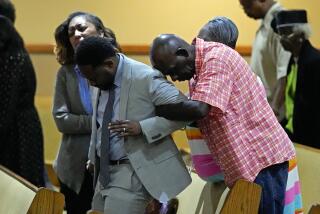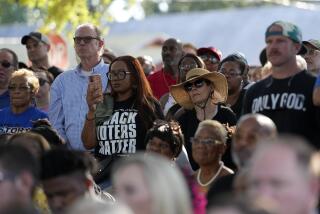Archbishop Desmond Tutu to Jacksonville: Be ‘open’ to gays
- Share via
Archbishop Desmond Tutu would like to have a word with Jacksonville, Fla., about gays and lesbians.
The Jacksonville City Council is considering an ordinance that would ban discrimination based on sexual orientation, and some of the debate has been tough.
The Florida Baptist Witness reported that a May 22 City Council meeting went past midnight so that roughly 100 attendees could speak for and against the bill, known as Bill 2012-296. Southern Baptist pastors and evangelical leaders argued against the measure on “moral grounds” -- “alleging the new ordinance could violate religious liberty, create new protected classes of individuals, and expose the city to unnecessary litigation.”
The Rev. R.L. Gundy, vice president of Jacksonville’s Southern Christian Leadership Conference, told the City Council that he was strongly opposed as well.
“I told them that this was wrong on the first day they were considering it,” Gundy told the Florida Times-Union. “I told them they have no idea how much harm this would do and they don’t know what they’re getting themselves into.”
So it might have been a surprise when the City Council received an emailed letter of support from Tutu — the Anglican archbishop of Cape Town, a Nobel Peace prize winner, and a key part of apartheid’s end in South Africa.
“Having had the opportunity to live in Jacksonville for several months, I came to love your fine city,” Tutu wrote in the letter, which was posted to Facebook by the Jacksonville Committee for Equality. Tutu was a scholar-in-residence at the University of North Florida for one semester in 2003.
Tutu said he recently heard about the city’s struggle over adding “sexual orientation” to its human rights ordinances.
“Knowing your city, I was shocked that these words were not already in this legislation. But knowing that they are not, I would urge you to act expeditiously in making sure that your city is open to all,” he wrote.
The South African civil rights leader, who was the first black Anglican Archbishop of both Johannesburg and Cape Town, has previously injected his opinion into American politics. During the presidential race in 2004, for example, he urged voters “to consider your vote not in terms of whether the individual is a Democrat or a Republican but whether he can lead your nation with wisdom and return your country to be a beacon of freedom and peace for the world.”
At the time, he also criticized the Iraq war and offered sympathies for Florida hurricane victims.
In contrast to Tutu’s support, some of the ordinance’s opposition comes from black pastors who are cautious about identifying the lesbian, gay, bisexual and transgender community’s struggles as civil-rights issues.
“To say it’s the same as black folk, well, to me, it’s not the same,” pastor Gary L. Williams of First Baptist Church of Mandarin told the Florida Times-Union. “It’s being made to sound the same, but it isn’t. I was born black. This skin isn’t coming off. I had no choice.”
Tutu’s letter of support comes from a different perspective.
“After dismantling apartheid, when we sat down to write our Constitution, we quite deliberately ensured that gays, lesbians and bisexuals were included in South Africa’s Constitution,” Tutu wrote. “Having ourselves suffered terribly, we did not want to inflict discrimination on any group that lived within our borders and we explicitly stated this for the world to know that we had learned the lessons taught by our unforgettable and regrettable history.”
He added, in closing, “I look forward to hearing positively from your good self.”
The Florida Times-Union reports that the bill may not see a vote until late July.
ALSO:
Sea level in Atlantic ‘hot spot’ rising faster than world’s
In Arizona, cheers and disillusionment follow immigration ruling
Jerry Sandusky letter to abuse victim: ‘There has been love in my heart’
More to Read
Sign up for Essential California
The most important California stories and recommendations in your inbox every morning.
You may occasionally receive promotional content from the Los Angeles Times.











